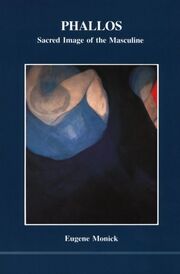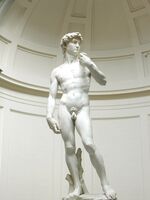Robert A. Johnson's He: Understanding Masculine Psychology
Masculine Psychology is a term sometimes used to describe and categorize issues concerning the gender related psychology of male human identity, as well as the issues that males confront during their lives. One stream emphasises gender differences and has a scientific and empirical approach, while the other, more therapeutic in orientation, is more closely aligned to the psychoanalytic tradition. It also relates to concepts such as masculinity and machismo.
Born of the female body
Jungian analysts Guy Corneau and Eugene Monick argue that the establishment and maintenance of the masculine identity is more delicate and fraught with complication than that of the establishment and maintenance of the female identity. Such psychologists suggest that this may be because males are born of the female body, and thus are born from a body that is a different gender from themselves. Females, on the other hand, are born from a body that is the same gender as their own.
| “ | A woman simply is, but a man must become. Masculinity is risky and elusive. It is achieved by a revolt from woman, and it is confirmed only by other men.[1] | ” |
Camille Paglia has commented that she believes that women are born, but men must "become". In other words, masculinity is not something that is granted by birth but is something that must be earned in adult life.
Assessment |
Biopsychology |
Comparative |
Cognitive |
Developmental |
Language |
Individual differences |
Personality |
Philosophy |
Social |
Methods |
Statistics |
Clinical |
Educational |
Industrial |
Professional items |
World psychology |
Social psychology: Altruism · Attribution · Attitudes · Conformity · Discrimination · Groups · Interpersonal relations · Obedience · Prejudice · Norms · Perception · Index · Outline
Role of the father
Sigmund Freud and Carl Jung argued that the father is very important to the male child's development of identity. In his book Absent Fathers, Lost Sons [2] Canadian Jungian analyst Guy Corneau writes that the presence of the father's body during the son's developmental phases is integral in the son developing a positive sense of self as a male. Corneau also argues that if the son does not develop positively towards the father's male body, then the son runs the risk of developing negatively towards all bodies. Sigmund Freud argued that in the son's mind, the father's body represents the law, and that the role of the father's body is to break the attachment the son feels to the mother and by extension his own anima.
Freudian analysts claim that all sons feel they are in competition with their father and often feel in a battle against the father. (Sigmund Freud referred to this as Oedipus Complex.) Freudian psychologists claim that the risk the son runs is that in some cases it is more difficult to win the battle against the father than to lose the battle against the father. This is because a common result of winning the battle against the father is that the son suffers tremendous guilt.
French psychoanalyst Annette Fréjaville has presented her thesis that all men experience what she terms "primary homosexuality". Primary homosexuality takes place very early in a son's life and consists of a "love story" between the son and father. This "love story" consists of idealizations by the son of the father during in which the son expresses an interest in his father and a desire to become what his father represents to him, e.g., "When I grow up I'm going to be like daddy." Fréjaville theorized that such recognition of similarity is the basis of all identification, and that such idealization and identification provides the son with a firm grounding in his own masculinity. [3]
Influence on Abrahamic religions
The Abrahamic religions are the most influential in the western world. Because these religions identify God exclusively as a male deity who is often referred to as "Father", and because these religions are for the most part founded by males, various scholars and psychologists have theorized that ultimately the Abrahamic religions dramatize important themes in a man's relationship with his father. The Abrahamic religions are therefore deeply influenced by masculine psychology.
In his book Moses and Monotheism, Sigmund Freud, the founder of psychoanalysis, presents his thesis that Judaism is the religion of the father and Christianity is the religion of the son.
Works of Eugene Monick

Cover of Eugene Monick's Phallos: Sacred Image of the Masculine
Eugene Monick PhD. is a Jungian Analyst practicing in Scranton, Pennsylvannia, and New York City. He is a graduate of the Virginia (Episcopal) Theological Seminary. He received his doctorate from the Union Graduate School, and his Diploma in Analytical Psychology from the C.G. Jung Institute in Zurich. Mr. Monick has published three books on masculine psychology.
Phallos: Sacred Image of the Masculine [1] was published in 1987. In this book, Mr. Monick correlates male sexuality and spirituality, saying that "phallos" (the erect penis) is something of an existential God-image for men. He also presents his thesis that there is a difference between masculinity and patriarchy. The author also argues that there is a deep need within men to participate in a fraternity with men and to have their maleness recognized by other men, but that our society often does not take this into account. The author claims that what usually results is that these needs become frustrated and manifest themselves in often anti-social behavior and activities, such as hazing rituals.
The author notes that it is puzzling that we live in what is largely considered a male-dominated society, and yet very little work has been done to understand the archetypal basis of masculinity. The author suggests that this may be due to the assumption of male superiority, which he suggests is founded on the belief that one should not question that which is deemed to be right and superior.
Castration and Male Rage [2] Mr. Monick writes that many of the ideas of this second book are founded on the ideas set forth in his first book. Since that first work designates phallos as an "existential god-image" for men, Mr. Monick writes that the suggestion of castration, whether symbolic or literal, is highly traumatic for males. Mr. Monick suggests that much of the anger expressed by men is in some ways related to their sense of castration.
To be published on May 1, 2006, Potency: Masculine Aggression as a Path to the Soul [3] is the third installment in what Mr. Monick has referred to as the "Phallos Trilogy". In this volume, Mr. Monick argues that the "collapse of patriarchy — that is, the social dominance of males as an assumed cultural given — is on our doorstep if not already in the house".
Homophobia
- See also: Gay panic defense and Violence
Issues of homophobia and gay bashing are of relevance to the study of masculine psychology. Every year, men, such as Matthew Shepard, die as a result of gay bashing [4]. The victims of gay bashing attacks are most often homosexual males [5], and heterosexual males are usually the perpetrators of gay bashing attacks [6] [7] [8]. The Oscar award winning movie Brokeback Mountain depicts the main characters as suffering as a result of gay bashing. Despite the works of Alfred Kinsey, which revealed that as many as 30% of the male population have engaged in homosexual sexual activity, and despite the published theories of Sigmund Freud, presenting his thesis that everyone is at some level bisexual, homophobia among the heterosexual male community has remained.
Another example of homophobia in Western society can be found in the different gender’s comfort level when addressing the topic of attractiveness of members of their own gender. Most heterosexual females feel comfortable to discuss the attractiveness of another member of their own gender. In such instances, the heterosexual woman’s sexual orientation would not likely be brought into question. Most heterosexual males, however, are uncomfortable with the idea of appraising the attractiveness of other members of their own gender. In Western societies, and in the United States in particular, a man who admits to seeing attractiveness in another male may be perceived as a latent homosexual.

Michelangelo's David.
Historical perspectives
Among artists and scientists during the Renaissance, it was the prevailing belief that the study of the male form was in itself a study of God. Michelangelo's David is based upon this artistic discipline, which is known as disegno. Under this discipline, sculpture is considered to be the finest form of art because it mimics divine creation. Because Michelangelo adhered to the concepts of disegno, he worked under the premise that the image of David was already in the block of stone he was working on—in much the same way as the human soul is thought by some to be found within the physical body.
Sports
- Main article: Sport psychology
Competitive sports are heavily influenced by masculine psychology. Though females do play sports, culturally male athletes are often accorded more attention and respect than their female counterparts. In professional sports, male sports leagues flourish while female sports often receive poor attendance at games and are often forced to close as a result. The Modern Olympics are based on the Ancient Olympic Games of Greece. In the ancient Greecian games, women were not only not allowed to compete in the games—they were not even allowed to attend the Olympic games. Sports terminology has been transmuted into common day slang, often with sexual connotation. For example, it is common for males to refer to "scoring" with a woman.
Notes
- ↑ Camille Paglia as quoted on Masculine Virtues site.
- ↑ "Absent Fathers, Lost Sons" listing
- ↑ Annette Fréjaville as quoted in "Absent Fathers, Lost Sons"
- ↑ Gay Bashing Retrieved June 5, 2006
- ↑ Violence against gays: "61% of these attacks were against gay men, 14% against lesbians, 2% against heterosexuals and 1% against bisexuals, while attacks against GLB people at large made up 20%." Retrieved June 5, 2006
- ↑ Violence against gays, lesbians, bisexuals, and the transgendered#Statistics
- ↑ Bureau of Justice Statistics Retrieved June 9, 2006
- ↑ Homicide trends in the U.S. Trends by gender Retrieved June 9, 2006
See also
- Animus
- Machismo
- Men's movement
- Men's studies
- Cerne Abbas giant
External links
- Masculine Psychology discussion group
- Masculine Psychology blog
- "Books on Masculine Psychology": Inner City Books (Studied in Jungian Psychology by Jungian Analysts)
- Masculine Psychology by Roya Monajem
- He: Understanding Masculine Psychology
- The Jung Page: Feminine and Masculine Psychology
- Books & Audio on Masculine Psychology By: Dr. Robert Moore
- A response paper by Harvey Hall, regarding Eugene Monick's "Phallos: Sacred Image of the Masculine"
| This page uses Creative Commons Licensed content from Wikipedia (view authors). |